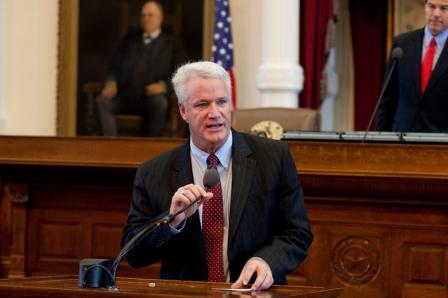
Guv for Life: Why the Texas House Ran Away from Term Limits

According to one recent poll, 80 percent of Texans favor enacting term limits for statewide officeholders and 93 percent are in favor of holding a vote on the issue. In March, the Texas Senate overwhelmingly endorsed a proposed constitutional amendment limiting statewide elected officials to just two terms. So why exactly did the movement fail in the House yesterday?
“I think they equivocated on their responsibility. And I feel very strongly about that,” Rep. Lyle Larson (R-San Antonio) said, referring to the failure of SJR 13 to pass in the House yesterday. The resolution was voted down 61-80, far short of the required two-thirds majority needed for a proposed constitutional amendment. The decision came with little debate.
“I did not anticipate it,” Larson said of the legislation’s easy defeat. “But yesterday, some of these guys, especially the new guys … they’re easily swayed. Folks tried to intimidate them through their web presence and saying they’re going to robocall their district and do those kind of things,” said Larson. “They’re easily manipulated.” Larson did not specify who these “folks” were, though he hinted they were proxies for Perry.
Overhanging the decision, of course, is Texas’ governor for life. Now in his 12th year as governor, Perry is the longest-serving governor in state history.
“I don’t know about y’all, but a lot of folks looked at the governor’s office and thought we already had term limits in place until the present governor decided to run for a third term,” Rep. Lyle Larson said on the House floor. “This is not a referendum on Rick Perry. I can tell you, Rick Perry [has] done a lot of great things for our state. It’s more about straightening out something that I think will bring an infusion of new blood, new ideas.”
The proposal, though, would have “grandfathered” current officeholders, allowing sitting officials like Perry to serve two more terms. It also would’ve only become law if Texas voters approved it.
On the House floor, what little discussion there was focused on clarifying some technicalities. Other lawmakers even praised Larson for sponsoring the resolution.
Larson was confident in the resolution’s passage. “It’s forward thinking in addressing some issues where people are frustrated,” he said yesterday on the floor. “From both sides, people are excited about the prospect.”
But it seems that too many representatives feared that voting for the resolution would send a message that they did not support Perry.
“The only thing I can say is folks were looking at it as a referendum on the governor,” said Larson. “I think that the [members] voted against it for various reasons, some of them just had philosophical problems with term limits, some of them just lacked the courage to vote the way their constituents wanted … and it was essentially relying on the voters to make the decision, we weren’t making the decision here. That’s what’s even more frustrating for folks.”
The issue will likely be revisited if Gov. Perry runs for another term in 2014.
“From a political standpoint and from all these other offices, I think that the drumbeat might get a lot louder in the [gubernatorial] primary and going into next session to try and alleviate our state from folks just sitting in an office for … political purposes,” said Larson.
And it could spell trouble in the next primary season for representatives who run on an anti-incumbency platform.
“There’ll be some blowback in the primary about this. There’s some guys that are already pretty upset. In the districts, these [representatives] ran as anti-incumbents. And then they can’t vote for term limits? They’ll have to deal with that,” said Larson.


